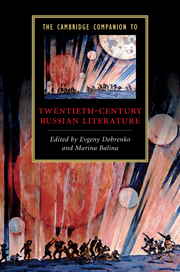Book contents
- Frontmatter
- 1 Poetry of the Silver Age
- 2 Prose between Symbolism and Realism
- 3 Poetry of the Revolution
- 4 Prose of the Revolution
- 5 Utopia and the Novel after the Revolution
- 6 Socialist Realism
- 7 Poetry after 1930
- 8 Russian Epic Novels of the Soviet Period
- 9 Prose after Stalin
- 10 Post-Soviet Literature between Realism and Postmodernism
- 11 Exile and Russian Literature
- 12 Drama and Theatre
- 13 Literature and Film
- 14 Literary Policies and Institutions
- 15 Russian Critical Theory
- Index
9 - Prose after Stalin
Published online by Cambridge University Press: 28 May 2011
- Frontmatter
- 1 Poetry of the Silver Age
- 2 Prose between Symbolism and Realism
- 3 Poetry of the Revolution
- 4 Prose of the Revolution
- 5 Utopia and the Novel after the Revolution
- 6 Socialist Realism
- 7 Poetry after 1930
- 8 Russian Epic Novels of the Soviet Period
- 9 Prose after Stalin
- 10 Post-Soviet Literature between Realism and Postmodernism
- 11 Exile and Russian Literature
- 12 Drama and Theatre
- 13 Literature and Film
- 14 Literary Policies and Institutions
- 15 Russian Critical Theory
- Index
Summary
The liberal changes that started in Soviet Russia after Stalin’s death (5 March 1953) came to be called ‘The Thaw’, after the 1954 novel of this title by Ilia Ehrenburg, in which the writer advocated for the artist’s right to self-expression, criticized the events of recent history, and expressed hope for change. During the ensuing decade, ‘thaws’ and ‘freezes’ alternated with each other; but throughout this period observers could see the seemingly unified, monolithic stratum of Soviet culture that had been shaped and consolidated in the preceding Stalinist period erode rapidly. A special role in these changes was allotted to literature, both documentary and belletristic, thereby affirming the classical postulate about the literature-centredness of Russian culture as a whole. Thaw literature had its own pioneers: the writer and critic Vladimir Pomerantsev is usually considered the main one of the ‘first Thaw’ because of the groundbreaking statements he made in his December 1954 article ‘On Sincerity in Literature’ (‘Ob iskrennosti v literature’) in the literary journal Novyi mir, in which he insisted on the sincerity of a writer’s work as the measure of artistic achievement. His claim that the writer should follow his own creative impulses rather than official party doctrine drew both accolades and harsh criticism; but it broke the silence about the situation in literature and the arts, and vigorous discussions about the state of literature began.
- Type
- Chapter
- Information
- The Cambridge Companion to Twentieth-Century Russian Literature , pp. 153 - 174Publisher: Cambridge University PressPrint publication year: 2011
- 1
- Cited by



